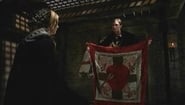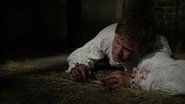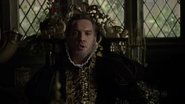あらすじ
The Tudors is a history-based drama series following the young, vibrant King Henry VIII, a competitive and lustful monarch who navigates the intrigues of the English court and the human heart with equal vigor and justifiable suspicion.
キャスト
エピソード
The Tudors: シーズン1

In Cold Blood
Henry prepares for war with France but receives cautious counsel from the powerful Cardinal Wolsey, who urges a treaty; the king learns that his queen's lady-in-waiting Elizabeth Blount is pregnant with his child.

Simply Henry
Henry contemplates an alliance with Holy Roman Emperor Charles V of Spain despite his "Field of Cloth of Gold" ceremony celebrating allegiance to France, and executes a rival; Elizabeth gives birth to the king's illegitimate son.

Wolsey, Wolsey, Wolsey!
A visit from Charles V forces Henry to conceal his growing disaffection from Queen Katherine, who is the influential Spanish monarch's aunt - even as Henry comes face-to-face with the seductive Anne Boleyn for the first time.

His Majesty, The King
As a reward for his denunciation of Martin Luther, the Pope christens Henry “Defender of the Faith,” but a brush with death causes the king to seek a solution to his lack of an heir. Princess Margaret marries the decrepit King of Portugal reluctantly, but the union is short-lived; Henry's desire for Anne Boleyn intensifies when Anne goes home to her family estate.

Arise, My Lord
Henry is shocked when he learns that his ally, Emperor Charles V of Spain, has released France's King Francis I from prison. He's equally surprised when Anne Boleyn turns him down after offering to make her his sole mistress.

True Love
As King Henry gains in confidence, his displeasure with the way the Catholic church handles his request for an annulment of his marriage to Katherine of Aragon grows. As a result, Cardinal Wolsey's position is weakening, leaving him vulnerable to his enemies.

Message to the Emperor
England's population is suffering, both from a lack of food and from a lethal plague called 'The Sweats'. As a result, King Henry feels depressed and not his usual, confident self. He starts having doubts about the future and his ability to rule the country. Fortunately for him, a change is coming up.

Truth and Justice
A papal envoy has come to discuss the annulment of the King's marriage to Katherine of Aragon, as requested by the King. The outcome of these discussions will determine Cardinal Wolsey's future career as well as the King's romance with Anne Boleyn. These discussions will also influence the nature of the relationship between England and Rome.

Look to God First
Cardinal Wolsey's fall is quick and pitiless. Stripped of office and authority, he is banished from the court and sent far from his much-beloved King. His unlikely successor is Sir Thomas More, a man unlike the overbearing Wolsey in every way but one...his loyalty to Henry.

The Death of Wolsey
Cardinal Wolsey is down but not yet out. Although exiled, he tries to gather last-minute support from his old enemy, Queen Katherine. She hesitantly agrees to his plan, as she finds herself in a situation similar to that of the fallen Cardinal. But their plot is intercepted by the King's new advisors and Wolsey must pay the ultimate price.
The Tudors: シーズン2

Everything is Beautiful
The King makes himself head of the Church of England while the Catholic Church fights a losing battle to control Henry VIII's desire for an annulment. Anne Boleyn demands that Henry break off contact with Katherine, so the noble Queen is banished from court. On top of that The Reformation is underway.

Tears of Blood
Christmas at the Tudor court is a time for ringing in the new. Mistress Anne Boleyn has replaced the banished Queen Katherine. The King's chaplain, Thomas Cranmer, makes a fact-finding visit to Lutheran Germany while Henry withdraws both the authority and taxes of the Catholic Church at home. And a royal visit to France finally convinces Anne to consummate her relationship with Henry, even as his best friend Charles Brandon suggests that she is no virgin.

Checkmate
Henry's patience finally wears out and he marries Anne in secret, appoints his Lutheran chaplain Thomas Cranmer the head of the Church of England, and strips Queen Katherine of her title and status; the king and new queen have their first child, and are disappointed that it's a girl...whom they christen Elizabeth.

The Act of Succession
Sir Thomas More refuses to accept Henry's command that his people swear an oath of "allegiance and recognition of the King's supremacy" to both church and state. Anne is made aware of the King's womanizing ways, and arranges then gives her blessing to his next mistress. Also, Anne has a confrontation with Lady Mary, Henry's daughter.

His Majesty's Pleasure
Attempts to legitimise the King's marriage and increase his power hit unmovable obstacles as Sir Thomas More and Bishop Fisher insist that only God can be head of the church. Imprisoned in the Tower of London they face likely execution unless they take the Oath of Allegiance. Meanwhile Henry's wandering eye continues to roam.

The Definition of Love
As the Reformation gathers pace Sir Thomas Cromwell becomes ever more powerful as propagandist-in-chief of a new moral order. Royal confidence has given way to doubt. Henry is haunted by the memory of the executed Thomas More while Queen Anne Boleyn's insecurities border on paranoia. Her husband's affairs continue and an effort to have her daughter Elizabeth betrothed to a French royal fails when the French King refuses to recognise that the infant Princess is of legitimate birth.

Matters of State
The English Reformation is in full swing. Queen Anne suffers from nightmares and feels threatened by Katherine and her daughter. Henry pays an unplanned visit to an old friend, Sir John Seymour, father of Jane Seymour.

Lady in Waiting
At Henry's command Jane Seymour is made a lady-in-waiting to Anne Boleyn, to the discomfort and suspicion of the Queen. When Henry is seriously injured in a jousting match all thoughts turn to who might succeed him. There will be far-reaching consequences if Anne's pregnancy does not deliver a healthy son.

The Act of Treason
Anne has lost a son and with it her last chance at a lasting marriage with Henry. The King's affections are shifting anyway: the Seymour family are awarded rooms at court and seem likely to replace the Boleyns as royal favourites. Several in the court begin to move against Anne who is accused of adultery. Arrests are made of suspected lovers and of Anne herself. All, including the Queen, are sentenced to death.

Destiny and Fortune
Queen Anne is imprisoned in the Tower, awaiting her execution. The king granted her wish for a special executioner, but he is delayed and the execution has to be postponed. King Henry proposes to Jane Seymour now that his marriage to Anne has been declared null and void. He hopes she will gave him a legitimate, male heir.
The Tudors: シーズン3

Civil Unrest
King Henry marries for the third time, taking as his queen the demure noblewoman Jane Seymour. A growing number of his subjects protest the king's decision to abandon the Catholic Church.

The Northern Uprising
The uproar over the king's break with the Catholic Church turns into a full-blown rebellion that comes to be known as "The Pilgrimage of Grace." Immobilized by an old jousting injury, Henry sends Charles Brandon to deal with the uprising and focuses his attention on the Lady Ursula Misseldon.

Dissention and Punishment
Henry reconciles with his estranged daughters Mary and Elizabeth in time for the Christmas holidays, but betrays and brutally suppresses the rebellion against him after making conciliatory promises to the uprising's leaders.

The Death of a Queen
The leaders of the Pilgrimage of Grace uprising are put to death, but Brandon is disturbed by the cruelty and mercilessness of the suppression; Henry celebrates the birth of a son but his joy is short-lived as Queen Jane dies within days.

Problems in the Reformation
Henry remains in seclusion while mourning the queen's death, an opportunity that enemies of the crown seize to murder several friends of the court; Cromwell is disturbed when Henry doesn't resist his new church's similarities to Catholicism.

Search for a New Queen
Matchmaking begins in earnest as Cromwell schemes to secure the Reformation by marrying Henry to a Protestant wife - but the king's marital reputation precedes him; the condition of Henry's wounded leg turns life-threatening.

Protestant Anne of Cleves
War looms with France and Spain aligning against England with backing from Rome, so Henry agrees to a politically fortuitous marriage with Anne of Cleves (Joss Stone), a plain and unsophisticated German aristocrat he has never met.

The Undoing of Cromwell
Henry moves swiftly to annul his loveless marriage to Anne of Cleves, and beds a new mistress, 17-year-old Katherine Howard; Princess Mary falls in love with Duke Philip of Bavaria; Cromwell's fall from favor is sudden and dramatic.
The Tudors: シーズン4

Moment of Nostalgia
A long hot summer, thirty years into the reign of King Henry VIII, and well into middle age, Henry takes his fifth wife, Katherine Howard. The Queen's "low background" combined with her youth and beauty, arouses a lusty familiarity in certain members of King Henry's court most notably his handsome young servant Thomas Culpepper.

Sister
Thomas Culpepper - Henry VIII’s newest servant - continues to make eyes at his King’s young bride, Katherine Howard. Her servant suggests seduction. While the King shows his age by going to bed early during the Christmas celebration the young but not so innocent members of his court party on.

Something For You
Buoyed by the happiness that a young wife brings an aging man, Henry is noticeably more tolerant and forgiving than he once was. Such goodwill is well appreciated by the peasants of the North who gratefully accept Henry’s forgiveness for the Pilgrimage of Grace revolt, during a Royal visit. But the King’s benevolence may yet be tested by his new Queen: Katherine Howard has submitted to seduction by the young and handsome Thomas Culpepper.

Natural Ally
Rejuvenated by his tour of the north of England, Henry feels a new man and longs after his new Queen; unaware that her affections are diverted elsewhere. Katherine’s past begins to catch up as an old liaison comes looking for a job threatening to reveal all about their sexual history. Someone beats him to it when an anonymous letter is sent to the King containing accusations of adultery. Although unconvinced of the rumor, Henry confines Katherine to her apartments pending a thorough investigation.

Bottom Of The Pot
Lord Hertford’s investigation into allegations of the Queen’s infidelities moves with speed. Deeply upset by revelations of his beloved young wife’s sexual past, Henry weeps. But once adultery is uncovered, his response is swift and decisive.

You Have My Permission
Unmarried once more Henry reflects on his dynasty and orders a new Act of Parliament which restores the succession rights of his two daughters, the Princesses Elizabeth and Mary. His roving eye undaunted by age or experience, he notices the attractive soon-to-be widow Catherine Parr. After the disastrous mismatch of his last marriage a mature woman is just what he needs.

Sixth And The Final Wife
Henry marries Catherine Parr - his sixth and final wife. A loving step-mother and compassionate companion, Catherine is liked and respected by all at court save the Catholic Bishop Gardiner who suspects her to be a heretic. Henry prepares to invade France.

As It Should Be
The siege of Boulogne is a long, expensive and difficult military campaign that is finally won by Henry’s troops at great financial and human cost. Rejuvenated, Henry rejects the idea of marching on to further conquests, preferring to return to England in triumph.

Secrets of the Heart
Henry VIII’s health is on the slide: the recent siege of Boulogne has taken its toll on his aging body and his ulcerous leg is constantly in pain. Bishop Gardiner and the Catholic Church are once again in the ascendant at court but, tired of conflict, Henry demonstrates little enthusiasm for the ambitious Bishop’s accusation that Catherine Parr is a heretic.

Death of a Monarchy
Finale - Henry’s thoughts turn to his own mortality with the news that his long-time friend and sometimes foe King Francis, and his unshakable soldier Charles Brandon, are each dying. As he faces death, Henry encounters the ghosts of his former wives who each get a chance to confront him. Hans Holbein paints a last, iconic portrait of the Tudor King.
次のような何千もの追加の映画やテレビ番組をお見逃しなく。
今すぐInternationalNetflixを入手次のような何千もの追加の映画やテレビ番組をお見逃しなく。


























